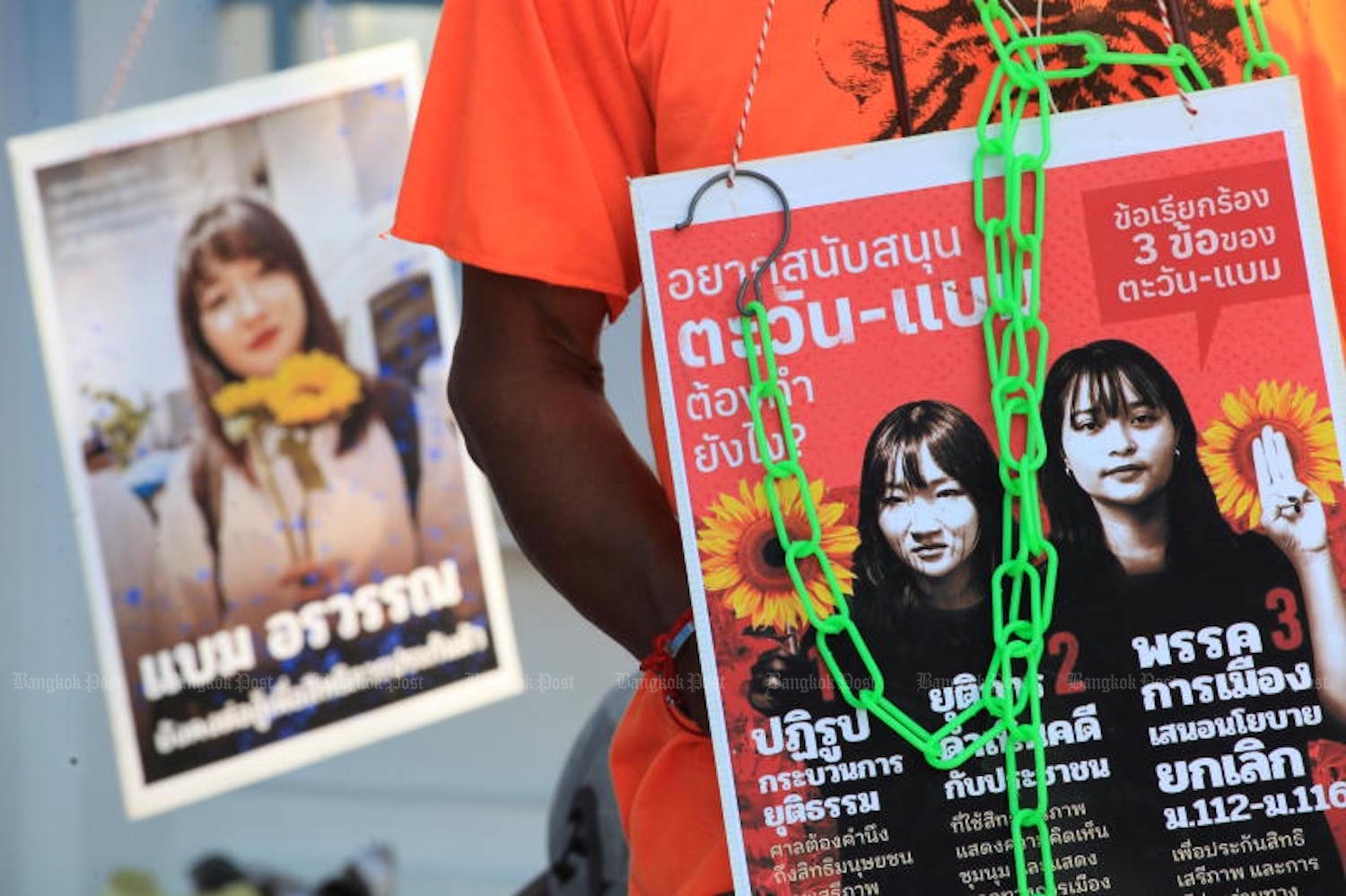
Two young activists announced on Saturday that they were ending their hunger strike after 52 days in order to receive treatment to save their lives so that they could continue their fight on behalf of political prisoners and judicial reform.
Tantawan “Tawan” Tuatulanon and Orawan “Bam” Phuphong are now under the close medical care of doctors at Thammasat University Hospital, said a statement released on their behalf.
Physicians and medical staff continue to be concerned about the functioning of their kidneys and other organs that have been affected by a long period without food and, on some occasions, water.
Ms Tantawan, 21, and Ms Orawan, 23, wanted to make their decision known that they would receive medical treatment to preserve their lives for their fight because the courts have not yet responded to all of their demands, the statement said.
The two women are alert and responsive, the statement said. But even though they are no longer at risk of a life-threatening health condition, they still need medical treatment for a certain period, it added.
Ms Tantawan, a university student, and Ms Orawan, a supermarket employee, began their hunger strike on Jan 18, refusing food as well as water. As their condition deteriorated, they agreed on Jan 30 to start taking small amounts of water, and later agreed to take some intravenous vitamins and minerals to reduce the risk to their health.
The pair were being treated at Thammasat University Hospital but they discharged themselves on Feb 24 to take their protest to the gates of the Supreme Court opposite Sanam Luang. A few dozen supporters joined them at the site, where they were being cared for in a temporary shelter. But a week later they were back in hospital in critical condition.
The main focus of the hunger strike was the release of 16 people detained pending trial on charges arising from the anti-government protests that began in mid-2020. Some had had multiple requests for bail rejected, but since the duo began fasting the courts have approved the release of 13 of the detainees.
The women for a long time insisted that they would not give up until the remaining three detainees were released. However, bail applications for two of those detainees have been rejected numerous times because they have been charged with possession of explosives, in this case ping-pong bombs.
In the end, Ms Tantawan and Ms Orawan decided it would be better to preserve their strength and get better to fight for the long haul.
According to the statement issued on Saturday, the two women expressed concern after learning that more activists charged with royal defamation over a November 2020 protest at the Germany Embassy in Bangkok were facing difficulties. A court hearing this week rejected their request for certain documents that their lawyers said were needed for a defence.
This was a proof, the statement said, that the young women’s demands for the release of all political prisoners were right, and they asked everyone to keep fighting.
In addition to the release of all political prisoners, the duo have been calling for the abolition of Section 112 of the Criminal Code, the lese-majeste law. They also want the repeal of Section 116, the anti-sedition law, and other justice reforms.
While Ms Tantawan and Ms Orawan drew a lot of sympathy from people concerned about their health, their cause has not gained much momentum as Section 112 in particular remains a highly sensitive issue.
Most political parties do not support any changes to the royal defamation law, especially with an election looming. Pheu Thai, the largest opposition party, has said it is open to discussions but declines to go beyond that.
Only the Move Forward Party has reform of Section 112 as part of its official policy platform. It proposes reducing jail terms from the current 3-15 years. As well, it says, only the Palace should be able to file a royal defamation complaint with police.
Under the current law, anyone can file a lese-majeste complaint against anyone else and police are obliged to investigate it. Consequently, many complaints are filed by people with political agendas who wish to silence opposition voices.
Ms Tantawan and Ms Orawan are themselves facing charges under Section 112 for taking a public poll last year about royal motorcades.
According to data from Thai Lawyers for Human Rights to Feb 28, 2023, 1,895 people have been prosecuted for political participation and expression since the beginning of the Free Youth pro-democracy protests in July 2020. At least 233 are facing lese-majeste charges and 128 have been charged with sedition.

A doctor from the Police General Hospital, accompanied by lawyer Krisadang Nutcharus, checks in on hunger strikers Tantawan Tuatulanon and Orawan Phuphong outside the Supreme Court on Feb 28. Three days later they had to be taken back to hospital as their condition worsened. (Photo: Wichan Charoenkiatpakul)